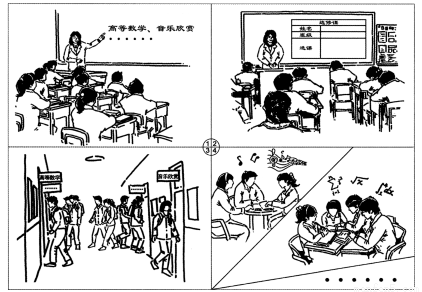

科目: 来源:2014-2015学年北京市朝阳区高三一模考试英语试卷(解析版) 题型:单项填空
She doesn’t speak our language, _____ she seems to understand what we say.
A.for B.and C.yet D.or
查看答案和解析>>
科目: 来源:2014-2015学年北京市朝阳区高三一模考试英语试卷(解析版) 题型:单项填空
—How are you getting along with your German, Kate?
—Oh, Mr.Black, I’m so tired of it.Maybe I should drop out _____ it kills me.
A.when B.after C.while D.before
查看答案和解析>>
科目: 来源:2014-2015学年北京市朝阳区高三一模考试英语试卷(解析版) 题型:单项填空
Comparison may make something appear more beautiful than it is when _____ alone.
A.seen B.seeing C.see D.to see
查看答案和解析>>
科目: 来源:2014-2015学年北京市东城区高三下学期综合练习一 英语试卷(解析版) 题型:单项填空
1 think we'd better keep to the subject, we'11 waste our time.
A. and B.or C. but D. so
查看答案和解析>>
科目: 来源:2014-2015学年北京市东城区高三下学期综合练习一 英语试卷(解析版) 题型:单项填空
During the weekend, the health club is usually full of people to get in shape
A. try B.grew
C. trying D. having tried
查看答案和解析>>
科目: 来源:2014-2015学年北京市东城区高三下学期综合练习一 英语试卷(解析版) 题型:单项填空
The room he has just rent is about 9 meters length and 3 meters wide.
A.in B.on C.to D.at
查看答案和解析>>
科目: 来源:2014-2015学年北京市东城区高三下学期综合练习一 英语试卷(解析版) 题型:单项填空
My uncle has a large greenhouse in his garden he grows vegetables in winter
A. which B. where C. when D. whose
查看答案和解析>>
科目: 来源:2014-2015学年北京市东城区高三下学期综合练习一 英语试卷(解析版) 题型:单项填空
Spending a few hours learning about the history and culture of the destination will help tourists understand they're seeing
A. what B. where
C. that D.why
查看答案和解析>>
科目: 来源:2014-2015学年北京市东城区高三下学期综合练习一 英语试卷(解析版) 题型:阅读理解
Etymology, the study of words and word roots, may sound like the kind of thing done by boring librarians in small, dusty rooms. Yet etymologists actually have a uniquely interesting job. They are in many ways just like archaeologists (考古学家) digging up the physical history of people and events. The special aspect of etymology is that it digs up history, so to speak, through the words and phrases that are left behind.
The English language, in particular, is a great field to explore history through words As a language, English has an extraordinary number of words. This is partly due to its ability to adapt foreign words so readily. For example, " English" words such as kindergarten (from German), croissant (from French), and cheetah (from Hindi) have become part of the language with little or no change from their original sounds and spellings. So English-language etymologists have a vast world of words to explore.
Another enjoyable thing about etymology for most word experts is solving word mysteries(谜). No, etymologists do not go around solving murders, like the great detective Sherlock Holmes. What these word experts solve are mysterious origins of some of our most common words
One of the biggest questions English language experts have pursued is how English came to have the phrase OK. Though it is one of the most commonly used expressions, its exact beginning is a puzzle even to this day. Even its spelling is not entirely consistent-unless you spell it Okay, it is hard even to call it a word.
Etymologists have been able to narrow OK’s origin down to a likely, although not certain, source(来源). It became widely used around the time of Martin Van Buren's run for president in 1840. His nickname was Old Kinderhook. What troubles word experts about this explanation is that the phrase appeared in some newspapers before Van Buren became well known. It is likely that Van Buren could be called its primary source Etymologists will doubtlessly keep searching for the initial source. However, it is clear that OK’s popularity and reputation have topped those of the American president to whom it has been most clearly linked.
1.The author mentions the words like "croissant" in Paragraph 2 to indicate .
A. words have changed a lot in the two languages
B. what English-language etymologists are exploring now
C. English has absorbed many words from other foreign languages
D. the English vocabulary is difficult to the non-English-speaking people
2.The underlined word "pursued" in Paragraph 4 means .
A. looked upon B. dug up
C. put in D. set down
3.We can learn from the passage that etymologists .
A. discover the possible origin of words
B. help detectives to solve mysterious murders
C. write interesting stories for some newspapers
D. explore the English language as well as the recent events
4.What is the main purpose of the passage?
A. To present the history of English words
B. To explain the procedure of an etymologist's job
C. To introduce the pleasure of the study of words and word roots.
D. To teach readers how to distinguish English and non-English words
查看答案和解析>>
科目: 来源:2014-2015学年北京市东城区高三下学期综合练习一 英语试卷(解析版) 题型:书面表达
假设你是红星中学高二(1)班的学生李华,下面四幅图描述了上学期高二年级开设选修课的过程。请根据图片的先后顺序,为校刊“英语园地”写一篇短文。词数不少于60。开头已给出,不计入总词数。

Last term , our school offered optional courses for the students in Senior 2.
查看答案和解析>>
湖北省互联网违法和不良信息举报平台 | 网上有害信息举报专区 | 电信诈骗举报专区 | 涉历史虚无主义有害信息举报专区 | 涉企侵权举报专区
违法和不良信息举报电话:027-86699610 举报邮箱:58377363@163.com